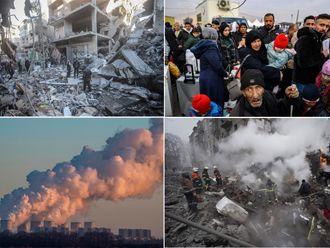Eastern Ghouta is wallowing in a dire humanitarian crisis. The agricultural belt surrounding the Syrian capital of Damascus is an area under siege. Food and medical supplies are running low, and malnutrition has plunged to abysmal levels. The misery of the 400,000 residents has been compounded by the incessant bombing inflicted by the Syrian regime on one of the last remaining pockets of opposition rule. Monday’s bombardment alone killed more than 130 people, one of the deadliest days for the area since it came under siege in 2013, according to the London-based Syrian Observatory for Human Rights. Nearly 600 people are injured and urgently require treatment. The sealed borders have left them trapped.
The world stands a mute spectator to the savagery unleashed on the residents of East Ghouta. What’s galling is the ceasefire agreement, brokered by the regime allies, remains a cruel joke. The air strikes continue in breach of the truce accord, and the death toll (more than 300 died in air strikes earlier this month) keeps rising. Neither the United Nations nor the global powers have raised their voice in protest. De-escalation has brought no succour. It remains a myth for Eastern Ghouta.
For the Syrian regime, Eastern Ghouta is the last hurdle. The state media calls it the “final Damascus battle”. The Bashar Al Assad government sees it as a major trophy in its savage pursuit to regain control of the entire country. So it’s little surprise that the regime rolled out sophisticated heavy artillery and put a “decorated officer” — the opposition calls Colonel Suhail Hassan a war criminal — in charge of the imminent ground operation. Perhaps, a victory in East Ghouta will strengthen its hands further in the peace negotiations — something the regime has shunned repeatedly.
In the face of such brutality, United Nations should intervene to avert a humanitarian tragedy. It should call for a 30-day ceasefire and lifting of the siege to prevent more deaths and destruction in Eastern Ghouta. That will also provide an opportunity for relief agencies to begin operations so that food, medicine, fuel and other aid material can be sent to a starving population cowering in basements and bunkers to escape massive aerial attacks.
The Syrian conflict has numbed the conscience of the world. More than 400,000 Syrians have been killed, and more than 10 million have been displaced so far. The seven-year civil war continues. The killings continue. The world has a responsibility to respond to humanitarian disasters. Eastern Ghouta is crying for help.


_resources1_16a45059ca3_small.jpg)




